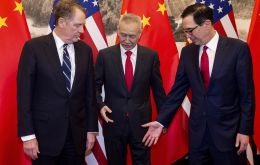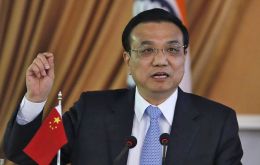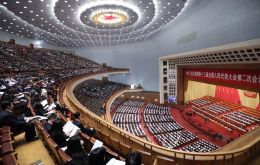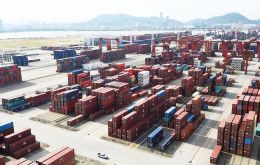MercoPress. South Atlantic News Agency
Tag: Li Keqiang
-
Saturday, March 5th 2022 - 09:50 UTC
Covid-19 measures and real estate debt are slowing economic growth, admits Beijing

China finally admits that the economy has suffered because of Covid 19 measures and the crackdown on real estate debt, and is this new “volatile, grave and uncertain” environment, the growth target has been lowered to “around 5,5%”.
-
Monday, October 19th 2020 - 08:32 UTC
China recovers in the third quarter but misses forecasts

China stepped up its economic recovery in the third quarter from the coronavirus shock but missed forecasts, pointing to continued challenges for one of the few drivers of global growth this year.
-
Monday, April 8th 2019 - 08:51 UTC
China and EU meeting to address trade, markets and Beijing control of strategic industries

China wants to work with the European Union on issues from climate change to trade, Premier Li Keqiang wrote in a German newspaper before a summit this week aimed at cementing ties.
-
Friday, March 29th 2019 - 09:18 UTC
New round of trade talks in Beijing. China offers greater access to its financial market

United States Treasury Secretary Steven Mnuchin said on Friday he had a “productive working dinner” the previous night in Beijing, kicking off a day of talks aimed at resolving the bitter trade dispute between the world's two largest economies.
-
Thursday, March 14th 2019 - 09:46 UTC
China's industrial growth output fell to a 17-year low in Jan/Feb

Growth in China’s industrial output fell to a 17-year low in the first two months of the year, pointing to further weakness in the world’s second-biggest economy that is likely to trigger more support measures from Beijing.
-
Wednesday, March 6th 2019 - 08:20 UTC
China's National Congress told the economy faces a “tough struggle ahead”

China's number two leader Li Keqiang has warned the country faces “a tough struggle,” as he laid out plans to prop up the world's second-largest economy. Opening the annual session of China's parliament, he forecast a slower growth of 6% - 6.5% this year, down from a target of around 6.5% in 2018.
-
Tuesday, March 5th 2019 - 09:55 UTC
World markets fall as China cuts its economic growth target

Asian shares stepped back on Tuesday after China cut its economic growth target and pledged measures to support the economy amid growing challenges from rising debt and a dispute over trade and technology with the United States. Australian shares dropped 0.6% while South Korea's Kospi lost 0.5%. MSCI's broadest index of Asia-Pacific shares outside Japan dipped 0.2% and Japan's Nikkei dropped 0.3%.
-
Thursday, September 27th 2018 - 09:17 UTC
China unveils plan to cut tariffs on over 1.500 industrial products

China on Wednesday unveiled plans to cut tariffs for products including machinery, electrical equipment and textile products beginning on Nov. 1, as the country braces for an escalating trade war with the United States.
-
Friday, September 21st 2018 - 08:35 UTC
US/Beijing trade war: China plans to reduce tariff rates on imports next October, reports Bloomberg

China plans to reduce the average tariff rate on imports from most of its trading partners as soon as October, Bloomberg News reported on Thursday. In July, China cut import tariffs on almost 1,500 consumer products ranging from cosmetics to home appliances as part of efforts to open up its economy, the world’s second biggest.
-
Tuesday, March 6th 2018 - 09:46 UTC
China increases its military budget 8.1% to US$ 175bn; regional powers “nervous”

China revealed on Monday that it will raise its military budget by US$ 175 billion for the 2018 fiscal year, 8.1% increase that is the largest military spending hike in three years. According to Premier Li Keqiang, the additional funding will “advance all aspects of military training and war preparedness, and firmly and resolvedly safeguard national sovereignty, security, and development interests.”
